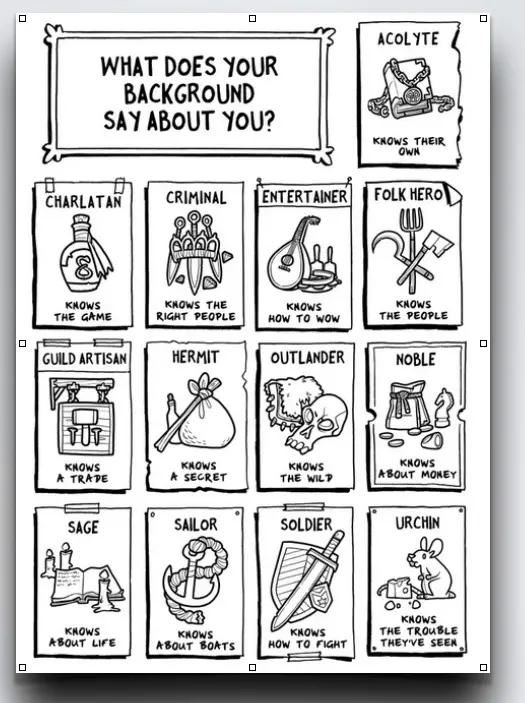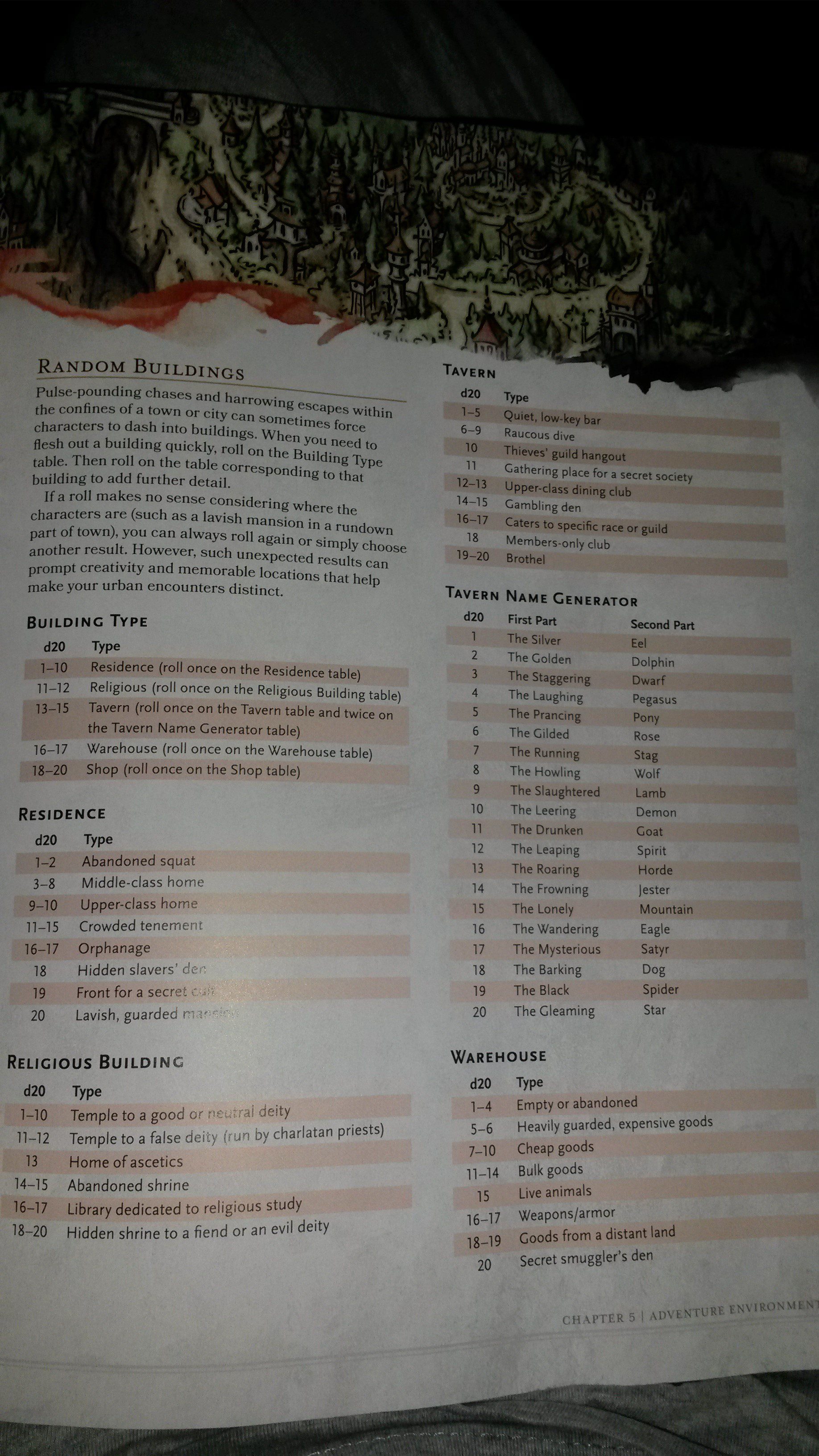Magic Item Table G (d100) Part of a treasure/loot generating system for 5th Edition Dungeons & Dragons. D100 result #1; 1-11. Where 5E does a fantastic job – in my opinion – is with the Spell slots. A multiclass character gains spell slots based on the power of the casting classes they are part of. A full caster – one that can potentially learn 9th level spells – adds 1 level to the basic caster table.
- Spell Sheet; Monster List; Magic Items; Encounter Size Calculator; Initiative Tracker; Random Generator; Random Dungeon Generator; Random Encounter Generator.
- Dungeon Master Tables. Useful tables for 5E Dungeons and Dragons. Magic Item Table A. D100 Magic Item; 01–50: Potion of healing: 51–60: Spell scroll (cantrip) 61.
- A character and 10 skeleton creatures for use in D&D 5E, perfect for any graveyard encounter. Tabletop gaming can teach us many things. The difference between intelligence and wisdom,The role luck.
Subpages
- Adventuring Gear
- Adventuring Gear by Other Publishers
- Armor
- Armor by Other Publishers
- Mounts and Vehicles
- Ships and Vehicles by Other Publishers
- Tools
- Tools by Other Publishers
- Weapons
- Weapons by Other Publishers
Common coins come in several different denominations based on the relative worth of the metal from which they are made. The three most common coins are the gold piece (gp), the silver piece (sp), and the copper piece (cp).
With one gold piece, a character can buy a bedroll, 50 feet of good rope, or a goat. A skilled (but not exceptional) artisan can earn one gold piece a day. The gold piece is the standard unit of measure for wealth, even if the coin itself is not commonly used. When merchants discuss deals that involve goods or services worth hundreds or thousands of gold pieces, the transactions don’t usually involve the exchange of individual coins. Rather, the gold piece is a standard measure of value, and the actual exchange is in gold bars, letters of credit, or valuable goods.
One gold piece is worth ten silver pieces, the most prevalent coin among commoners. A silver piece buys a laborer’s work for half a day, a flask of lamp oil, or a night’s rest in a poor inn.
One silver piece is worth ten copper pieces, which are common among laborers and beggars. A single copper piece buys a candle, a torch, or a piece of chalk.

In addition, unusual coins made of other precious metals sometimes appear in treasure hoards. The electrum piece (ep) and the platinum piece (pp) originate from fallen empires and lost kingdoms, and they sometimes arouse suspicion and skepticism when used in transactions. An electrum piece is worth five silver pieces, and a platinum piece is worth ten gold pieces.
Table Generator
A standard coin weighs about a third of an ounce, so fifty coins weigh a pound.
| Coin | CP | SP | EP | GP | PP |
|---|---|---|---|---|---|
| Copper (cp) | 1 | 1/10 | 1/50 | 1/100 | 1/1,000 |
| Silver (sp) | 10 | 1 | 1/5 | 1/10 | 1/100 |
| Electrum (ep) | 50 | 5 | 1 | 1/2 | 1/20 |
| Gold (gp) | 100 | 10 | 2 | 1 | 1/10 |
| Platinum (pp) | 1,000 | 100 | 20 | 10 | 1 |
Selling Treasure
Opportunities abound to find treasure, equipment, weapons, armor, and more in the dungeons you explore. Normally, you can sell your treasures and trinkets when you return to a town or other settlement, provided that you can find buyers and merchants interested in your loot.
Arms, Armor, and Other Equipment: As a general rule, undamaged weapons, armor, and other equipment fetch half their cost when sold in a market. Weapons and armor used by monsters are rarely in good enough condition to sell.
Magic Items: Selling magic items is problematic. Finding someone to buy a potion or a scroll isn’t too hard, but other items are out of the realm of most but the wealthiest nobles. Likewise, aside from a few common magic items, you won’t normally come across magic items or spells to purchase. The value of magic is far beyond simple gold and should always be treated as such.
Gems, Jewelry, and Art Objects: These items retain their full value in the marketplace, and you can either trade them in for coin or use them as currency for other transactions. For exceptionally valuable treasures, the GM might require you to find a buyer in a large town or larger community first.

Trade Goods: On the borderlands, many people conduct transactions through barter. Like gems and art objects, trade goods—bars of iron, bags of salt, livestock, and so on—retain their full value in the market and can be used as currency.
There are a lot of different things that can affect your character’s AC. New players sometimes struggle with this and even experienced players can sometimes get it wrong. Here is a checklist that might help.

How to calculate your Armor Class (AC)
First you calculate what armor class you get from your armor, then add your shield and lastly add any other bonuses or penalties you may have.
A) Figure your Base Armor Class. This depends on what type of armor you are wearing.
No Armor
• Start with 10.
• Add your Dexterity Modifier. Note that this can be a negative number.
• If you are a Barbarian you also add your Constitution Modifier.
• If you are a Monk you also add your Wisdom Modifier.
This total will be your base armor class.
Light Armor
• Start with your Dexterity Modifier. Note that this can be a negative number.
• If you have Padded or Leather armor add 11.
• If you have Studded leather armor add 12.
This total will be your base armor class.
Table Get
Medium Armor
• If your Dexterity Modifier is 2 or higher, Start with 2.
• If your Dexterity Modifier is 1 or lower, Start with your Dexterity Modifier. Note that this can be a negative number.
• If you have Hide armor add 12.
• If you have Chain shirt armor add 13.
• If you have Scale mail or Breastplate armor add 14.
• If you have Half plate armor add 15.
This total will be your base armor class.
Heavy Armor
• If you have Ring mail armor your base armor class is 14.
• If you have Chain mail armor your base armor class is 16.
• If you have Splint armor your base armor class is 17.
• If you have Plate armor your base armor class is 18.

B) Add your shield if you are using one.
• If you have a Shield add 2 to your base armor class.
C) Add any magical adjustments.
• If you are using magical armor add it’s magical bonus.
• If you are using a magical shield add it’s magical bonus.
• If you have any other magical items or magical adjustments to you armor class add those.
D) Add any miscellaneous adjustments.
• If there are any rules or features of the game that add or subtract from your armor class add those.
Table German
The total of all of this will be your armor class (AC).
